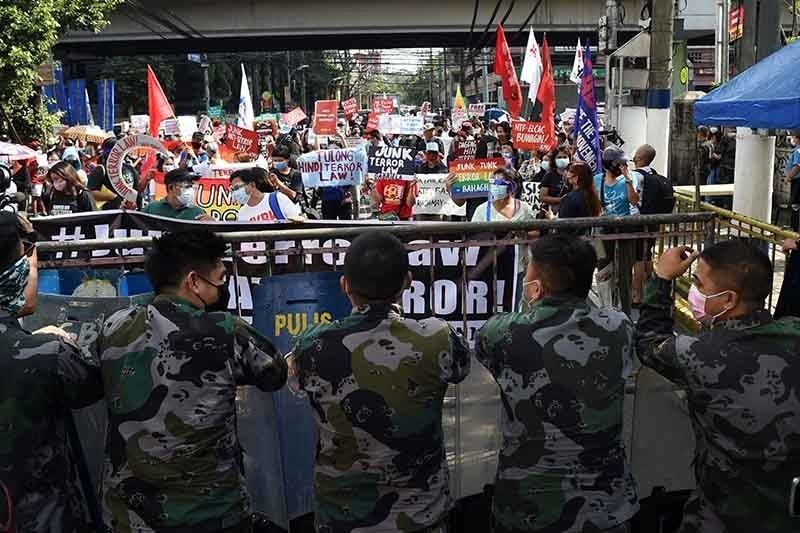SC ruling on anti-terrorism law: 'Small, important' win for 'defeated' human rights

MANILA, Philippines — The long, anxious wait of 37 groups of petitioners assailing the Anti-Terrorism Act of 2020 ended with a “small win,” as the Supreme Court struck down a dangerous qualifier on protests and advocacy work but they vowed: The bigger fight for human rights continues.
The SC voted 12-3 to declare as unconstitutional the qualifier to the proviso in Section 4 of the Republic Act 11479, that read "which are not intended to cause death or serious physical harm to a person, to endanger a person’s life, or to create a serious risk to public safety" for being "overbroad and violative of freedom of expression."
The qualifier was attached to exception that "terrorism as defined in this section shall not include advocacy, protest, dissent, stoppage of work, industrial or mass action, and other similar exercises of civil and political rights."
Rep. Edcel Lagman (Albay), one of the oralists, welcomed the SC move which he said "corrects the erroneous and dangerous view of the law’s proponents that equate activism with terrorism."
The move of the SC may ease the fears of some of the petitioners, including groups that mount protests and rallies, who raised that the wording of the assailed section is vague and gives authorities, whose track record does not inspire confidence, unbridled discretion on how to entertain it.
For the Free Legal Assistance Group, the SC vote on part of Section 4, is an "important win for the protection of civil liberties."
"The vote 12-3, as contained in the Court’s advisory, sustains FLAG’s position on this issue and affirms the inherent danger posed to civil liberties by the language of the qualifier to the proviso," they added.
Court rules activism is not terrorism
BAYAN Secretary General Renato Reyes said in a statement: "Our main win from the SC ruling on the terror law is that activism is not terrorism. This is a partial victory for petitioners as protests and advocacy are not acts of terror."
The National Union Peoples’ of Lawyers, counsel to petitioners and to many activists haled to court, said the SC's move was an assurance on the exercise of civil and political rights. It "[sustains] our position that activism and advocacy are legitimate activities and sacred rights of the people and should not be considered as terrorism at all," they added.
Lawyer Tony La Viña, counsel for Indigenous Peoples petitioners, also counted the SC ruling as a "small but important victory in a big defeat for human rights."
"The declaration of unconstitutionality of the provision in Section 4—which defined terrorism as including constitutionally protected acts when it leads to certain outcomes—is a big victory for the petitioners. But it is a small victory in what is still a big defeat for human rights," he added.
Large part of the law still intact
Aside from the declaring part of Section 4 as unconstitutional, the SC also voted 9-6 that allowing the Anti-Terrorism Council to adopt requests for designation by other jurisdictions or supranational jurisdictions is unconstitutional, the second method of designation under the law.
The third item on the advisory meanwhile read: "On the basis of the current petitions, all the other challenged petitions of R.A 11479 are not unconstitutional."
It also advised the parties and the public to "await the publication and read the decision and the separate opinions for the explanation of votes."
Lawyer Theodore Te, also counsel to petitioners, told reporters that the basis for the third item on the advisory remains unclear. Stressing that it is still largely speculation, he said the court may have ruled based on whether facial challenge—which petitioners mounted—is applicable to other provisions of the law.
But as it is, a large part of the feared anti-terrorism law still stands.
The heavily challenged power of the Anti-Terrorism Council to designate individuals and groups as terrorists upon finding of probable cause, which will trigger the freeze of subject’s assets, and the section of prolonged detention of up to 24 days has been retained.
BAYAN’s Reyes pointed out: "[T]he dangerous provisions of the terror law remain and can still be abused. Other dangerous provisions on designations, proscription, warrantless arrests and prolonged detention remain and must be challenged."
Karapatan Secretary General Cristina Palabay, meanwhile said that the SC’s move to "adopt repressive provisions… will only set to worsen the already dismal human rights situation in the country."
House Deputy Minority Leader Carlos Zarate (Bayan Muna partylist) said the SC’s affirmation of "many anti-people provisions" of the law "may still give the president, especially now President Duterte, a booster shot for further attacking his critics and the opposition."
Petitioners swore that they will continue to fight these provisions that they assert remain dangerous for the people’s rights.
La Viña said: "The fight including the motions for reconsideration—must now focus on the provisions that affect due process and other rights of accused: arrest, detention, designation by Anti-Terror Council, freezing of funds."
NUPL president Edre Olalia vowed: "We will certainly regroup and close ranks and file a motion for reconsideration. We will not allow the dying of the flickering light of our basic rights."
- Latest
- Trending





























